人教新目标(Go for it)版七年级下册Unit 12 What did you do last weekend? Section A 1a~2d课件(共29张PPT)
文档属性
| 名称 | 人教新目标(Go for it)版七年级下册Unit 12 What did you do last weekend? Section A 1a~2d课件(共29张PPT) |
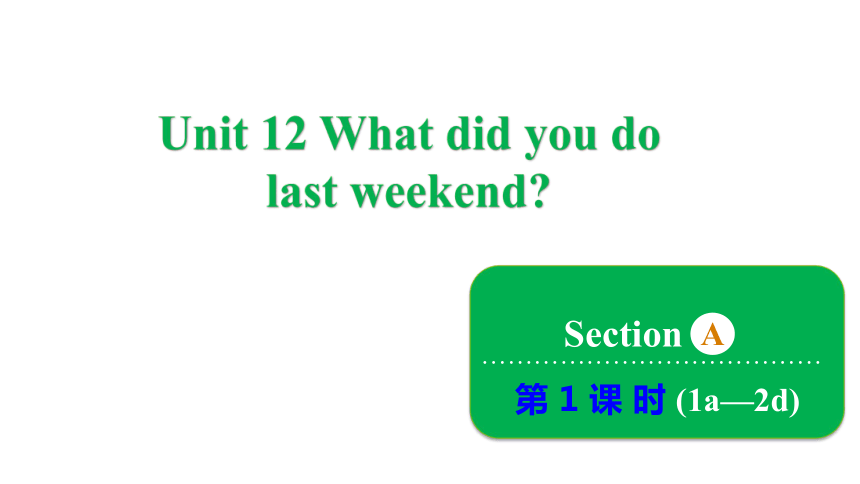
|
|
| 格式 | pptx | ||
| 文件大小 | 4.7MB | ||
| 资源类型 | 教案 | ||
| 版本资源 | 人教新目标(Go for it)版 | ||
| 科目 | 英语 | ||
| 更新时间 | 2024-05-02 22:00:39 | ||
图片预览

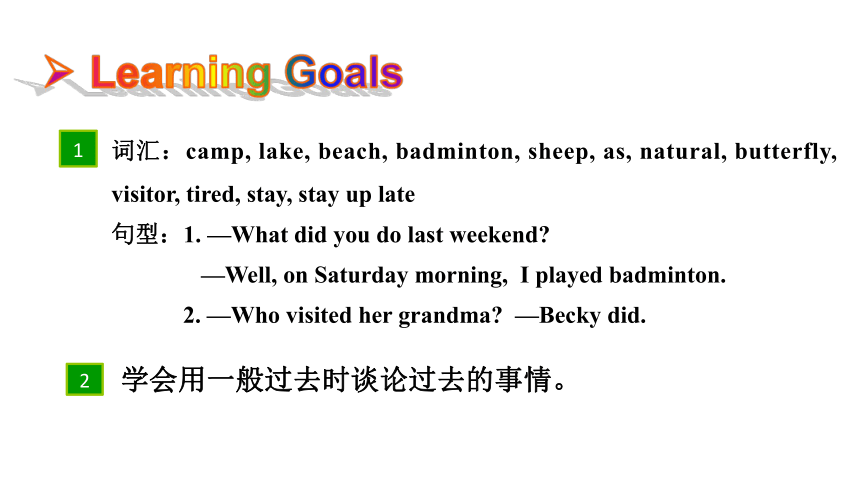
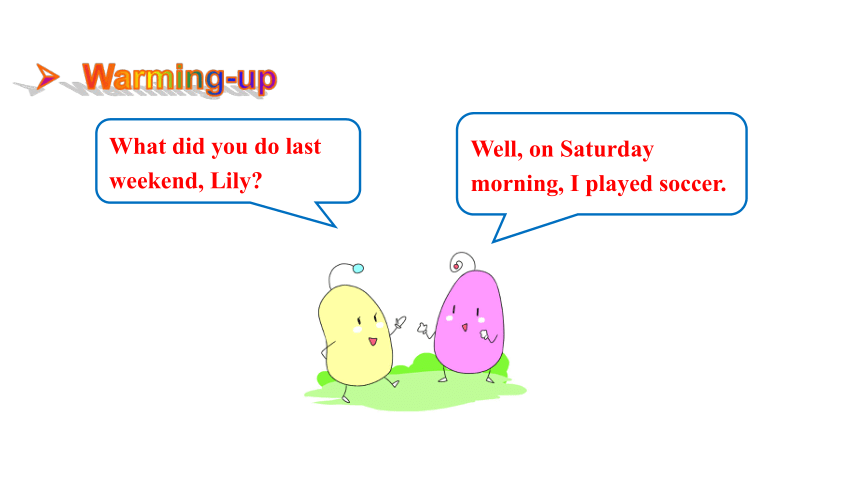
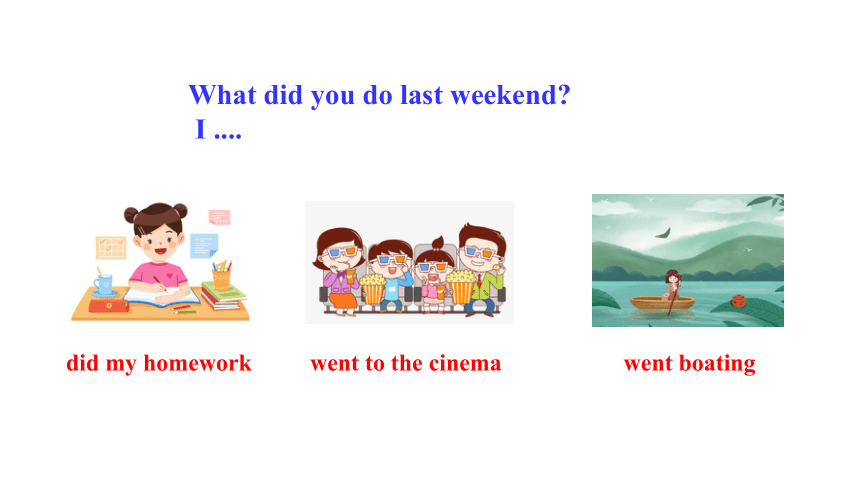
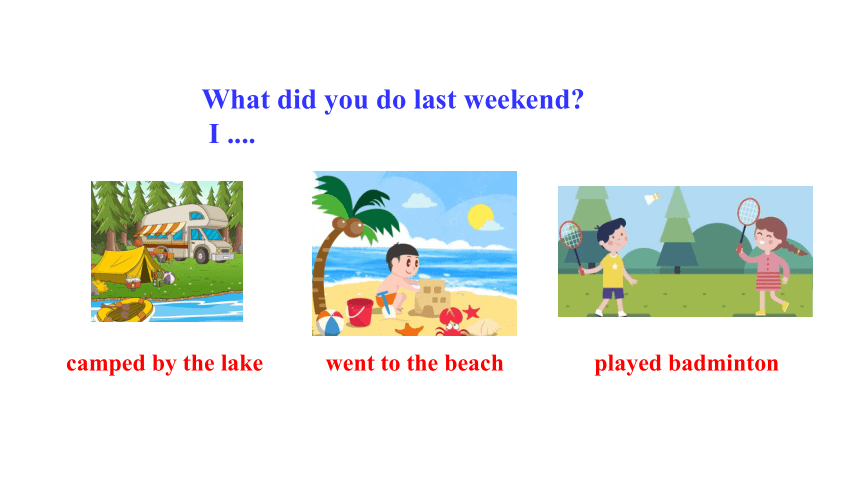
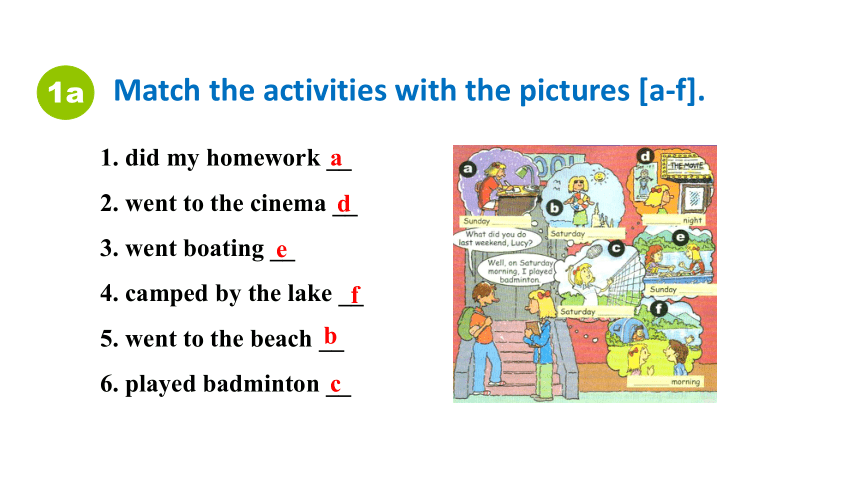
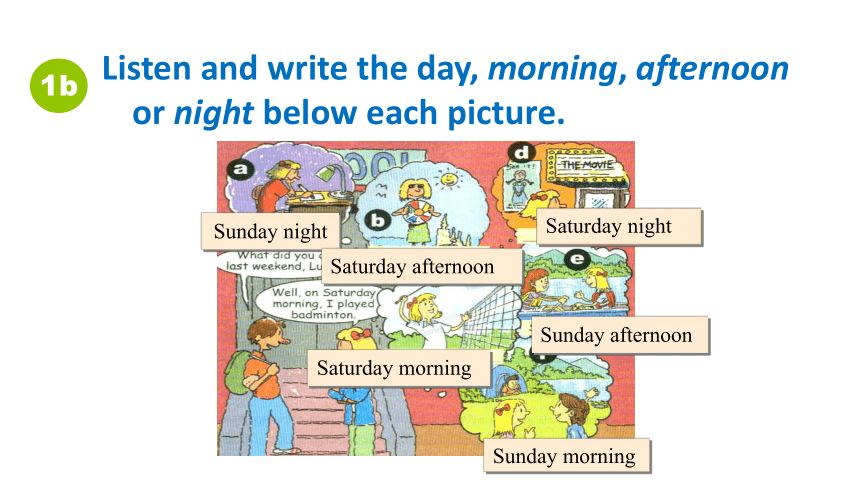
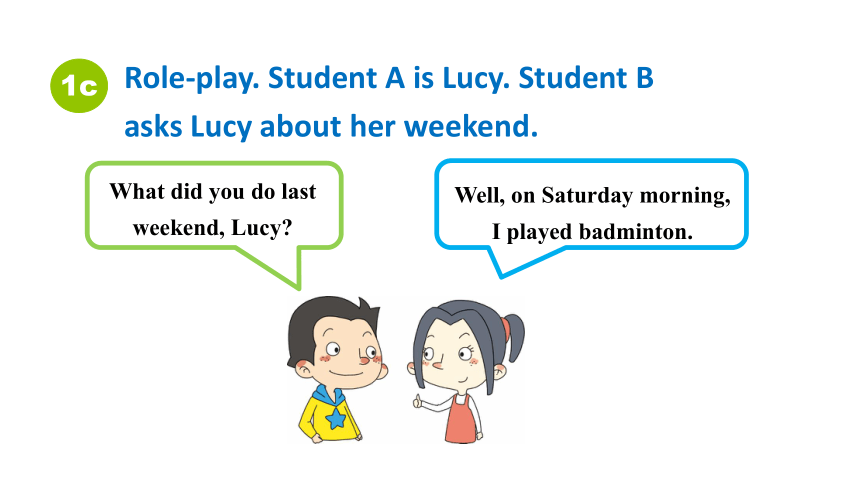
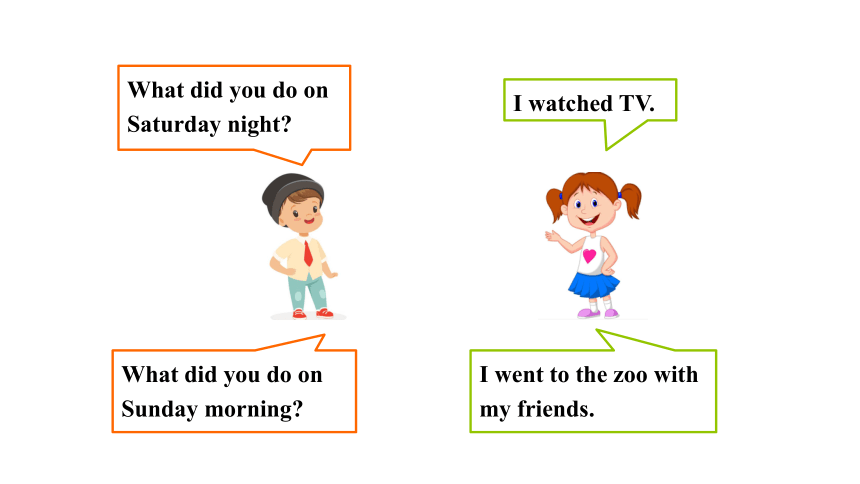
文档简介
(共29张PPT)
Section
Unit 12 What did you do last weekend
第 1 课 时 (1a—2d)
…………………………………
A
词汇:camp, lake, beach, badminton, sheep, as, natural, butterfly, visitor, tired, stay, stay up late
句型:1. —What did you do last weekend
—Well, on Saturday morning, I played badminton.
2. —Who visited her grandma —Becky did.
1
学会用一般过去时谈论过去的事情。
2
Learning Goals
1
2
Well, on Saturday morning, I played soccer.
What did you do last weekend, Lily
Warming-up
What did you do last weekend
I ....
did my homework
went to the cinema
went boating
What did you do last weekend
I ....
camped by the lake
went to the beach
played badminton
Match the activities with the pictures [a-f].
1. did my homework __
2. went to the cinema __
3. went boating __
4. camped by the lake __
5. went to the beach __
6. played badminton __
f
a
e
b
d
c
1a
Listen and write the day, morning, afternoon or night below each picture.
Sunday night
Saturday afternoon
Sunday afternoon
Saturday morning
Sunday morning
Saturday night
1b
Role-play. Student A is Lucy. Student B
asks Lucy about her weekend.
What did you do last weekend, Lucy
Well, on Saturday morning, I played badminton.
1c
I watched TV.
What did you do on Saturday night
What did you do on Sunday morning
I went to the zoo with my friends.
Listen and underline the words you hear.
1. ____ I visited my (aunt/grandma).
2. ____ I did my (homework/sports).
3. ____ I studied for the (English/math) test.
4. ____ I went to a (farm/beach).
5. ____ I fed some (sheep/cows).
B
2a
Listen again. Write C for Carol, J for Jack or B
for Becky next to the statements in 2a.
1. ____ I visited my (aunt/grandma).
2. ____ I did my (homework/sports).
3. ____ I studied for the (English/math) test.
4. ____ I went to a (farm/beach).
5. ____ I fed some (sheep/cows).
B
B
C
J
J
2b
Student A asks questions with who, what or
where and Student B answers. Then change roles.
Who visited her grandma
Becky did.
2c
What did Carol do last weekend
Now make your own conversation with your partner.
Where did Jack go
She studied for her English test.
He went to a farm.
Pair work
Role-play the conversation.
Paul: Hi, Lisa. How was your weekend
Lisa: Great, thanks.
Paul: What did you do
Lisa: I worked as a guide at the Natural History Museum.
Paul: Really How interesting!
Lisa: Yeah, it was fun. They have a butterfly house with over 200 kinds of
butterflies! I told the visitors about them and their living habits. Did
you have a good weekend
Paul: Yeah, it was good, but I’m kind of tired now. I stayed up late to watch
the soccer game.
2d
How was Lisa’s weekend
_____________
2. Where did Lisa work as a guide __________________________
Read the conversation and answer the questions.
It was great.
At the Natural History Museum.
3. What did she do there
______________________________________________________
4. Why is Paul tired now
_____________________________________________
She told the visitors about the butterflies and their living habits.
Because he stayed up late to watch the soccer game.
sheep 名词,意为“绵羊”。它是单复数同形的单词,当它作主语时谓语动词的单复数形式要根据它在句中的意思来确定。类似的单词还有deer (鹿), Chinese (中国人)等。
e.g. Look, there are three sheep eating grass under the tree.
看! 树下有三只羊在吃草。
Language points
1
I fed some (sheep/cows). 我喂了一些(羊/牛)。
I worked as a guide at the Natural History Museum.
我在自然历史博物馆里做导游的工作。
句中的as是介词,意为“作为;当作”。
My sister works as a nurse in a hospital.
我妹妹在一家医院当护士。
2
How interesting! 多么有趣啊!
这是个感叹句。感叹句结构是“How + 形容词/副词(+主语+谓语)! ”,表示“多么……!”
e.g. Look at that bird. How beautiful!
瞧那只鸟,多么漂亮呀!
3
【拓展】
Wow! What beautiful music! I like it very much. 哇!多动听的音乐啊!我很喜欢。
感叹句还可以使用“What + a(an)+形容词+名词+主语+谓语!”对名词进行感叹。
They have a butterfly house with over 200 kinds of
butterflies!他们有一个蝴蝶屋,有200多种蝴蝶!
kind 在此作名词, 意为“种类, 同类”。
【短语】
a different kind of... 一种不同的
all kinds of... 各种各样的
kind of 有点
4
I told the visitors about them and their living habits.
我告诉游客关于它们和它们的生活习惯。
1. told 是 tell的过去式。意为“告诉, 说;辨别;吩咐;讲述”。
Ma Ling told me about her holiday.
马玲告诉我关于她的假期的事情。
tell sb. about sth. 告诉某人关于某事
5
tell sb. to do sth. 叫某人做某事
ask sb. to do sth. 叫某人去做某事
teach sb. to do sth. 教某人做某事
Mother tells me to clean my room.
妈妈让我打扫自己的房间。
类似结构:
【拓展】
2. living habits 生活习惯/习性
They didn’t find any living things on the moon.
他们在月球上没有发现任何活着的东西。
living 作形容词, 意为“活着的”。
living 此处为动词 live 的动名词形式。
Did you have a good weekend
你周末过得愉快吗?
have a good weekend 周末过得愉快
have a good rest 好好休息
have a good time/have fun 玩得高兴
have a good trip 旅途愉快
【拓展】
6
I stayed up late to watch the soccer game.
我熬夜看足球比赛了。
stay up late意为“深夜不睡;熬夜”。
stay 作不及物动词, 意为“停留;待”。
I stayed up late until two o’clock in the morning.
熬夜一直到凌晨两点。
7
stay in 待在室内;不外出
stay at home 待在家里
stay out 待在户外
stay away from 离开, 不接近
stay up 熬夜
与stay相关的短语
【拓展】
一、用括号内所给单词的适当形式填空。
1. On Saturday morning, I ______(play) badminton with my brother.
2. I saw a lot of _______(sheep) on the farm.
3. Today we had some _______(visit) from London.
4. —What did you do last weekend
—I _______(camp) by the lake.
Exercises
played
sheep
visitors
camped
— Hi, Lily. _____ ____ your weekend
— Not bad. I _____ ___ the farm, and ____ a big ______.
— Really Sounds ___________.
— What did you do, Sam
— Well, I _____ ________ with my friends in the
afternoon. And I _______ ___ late to do my __________.
How was
saw
went to
二、看图补全对话。
sheep
interesting
went boating
homework
stayed up
复习一般过去时的构成方式,并总结其变化规律。
写一篇短文,介绍一下你周末都做了些什么。
Homework
Section
Unit 12 What did you do last weekend
第 1 课 时 (1a—2d)
…………………………………
A
词汇:camp, lake, beach, badminton, sheep, as, natural, butterfly, visitor, tired, stay, stay up late
句型:1. —What did you do last weekend
—Well, on Saturday morning, I played badminton.
2. —Who visited her grandma —Becky did.
1
学会用一般过去时谈论过去的事情。
2
Learning Goals
1
2
Well, on Saturday morning, I played soccer.
What did you do last weekend, Lily
Warming-up
What did you do last weekend
I ....
did my homework
went to the cinema
went boating
What did you do last weekend
I ....
camped by the lake
went to the beach
played badminton
Match the activities with the pictures [a-f].
1. did my homework __
2. went to the cinema __
3. went boating __
4. camped by the lake __
5. went to the beach __
6. played badminton __
f
a
e
b
d
c
1a
Listen and write the day, morning, afternoon or night below each picture.
Sunday night
Saturday afternoon
Sunday afternoon
Saturday morning
Sunday morning
Saturday night
1b
Role-play. Student A is Lucy. Student B
asks Lucy about her weekend.
What did you do last weekend, Lucy
Well, on Saturday morning, I played badminton.
1c
I watched TV.
What did you do on Saturday night
What did you do on Sunday morning
I went to the zoo with my friends.
Listen and underline the words you hear.
1. ____ I visited my (aunt/grandma).
2. ____ I did my (homework/sports).
3. ____ I studied for the (English/math) test.
4. ____ I went to a (farm/beach).
5. ____ I fed some (sheep/cows).
B
2a
Listen again. Write C for Carol, J for Jack or B
for Becky next to the statements in 2a.
1. ____ I visited my (aunt/grandma).
2. ____ I did my (homework/sports).
3. ____ I studied for the (English/math) test.
4. ____ I went to a (farm/beach).
5. ____ I fed some (sheep/cows).
B
B
C
J
J
2b
Student A asks questions with who, what or
where and Student B answers. Then change roles.
Who visited her grandma
Becky did.
2c
What did Carol do last weekend
Now make your own conversation with your partner.
Where did Jack go
She studied for her English test.
He went to a farm.
Pair work
Role-play the conversation.
Paul: Hi, Lisa. How was your weekend
Lisa: Great, thanks.
Paul: What did you do
Lisa: I worked as a guide at the Natural History Museum.
Paul: Really How interesting!
Lisa: Yeah, it was fun. They have a butterfly house with over 200 kinds of
butterflies! I told the visitors about them and their living habits. Did
you have a good weekend
Paul: Yeah, it was good, but I’m kind of tired now. I stayed up late to watch
the soccer game.
2d
How was Lisa’s weekend
_____________
2. Where did Lisa work as a guide __________________________
Read the conversation and answer the questions.
It was great.
At the Natural History Museum.
3. What did she do there
______________________________________________________
4. Why is Paul tired now
_____________________________________________
She told the visitors about the butterflies and their living habits.
Because he stayed up late to watch the soccer game.
sheep 名词,意为“绵羊”。它是单复数同形的单词,当它作主语时谓语动词的单复数形式要根据它在句中的意思来确定。类似的单词还有deer (鹿), Chinese (中国人)等。
e.g. Look, there are three sheep eating grass under the tree.
看! 树下有三只羊在吃草。
Language points
1
I fed some (sheep/cows). 我喂了一些(羊/牛)。
I worked as a guide at the Natural History Museum.
我在自然历史博物馆里做导游的工作。
句中的as是介词,意为“作为;当作”。
My sister works as a nurse in a hospital.
我妹妹在一家医院当护士。
2
How interesting! 多么有趣啊!
这是个感叹句。感叹句结构是“How + 形容词/副词(+主语+谓语)! ”,表示“多么……!”
e.g. Look at that bird. How beautiful!
瞧那只鸟,多么漂亮呀!
3
【拓展】
Wow! What beautiful music! I like it very much. 哇!多动听的音乐啊!我很喜欢。
感叹句还可以使用“What + a(an)+形容词+名词+主语+谓语!”对名词进行感叹。
They have a butterfly house with over 200 kinds of
butterflies!他们有一个蝴蝶屋,有200多种蝴蝶!
kind 在此作名词, 意为“种类, 同类”。
【短语】
a different kind of... 一种不同的
all kinds of... 各种各样的
kind of 有点
4
I told the visitors about them and their living habits.
我告诉游客关于它们和它们的生活习惯。
1. told 是 tell的过去式。意为“告诉, 说;辨别;吩咐;讲述”。
Ma Ling told me about her holiday.
马玲告诉我关于她的假期的事情。
tell sb. about sth. 告诉某人关于某事
5
tell sb. to do sth. 叫某人做某事
ask sb. to do sth. 叫某人去做某事
teach sb. to do sth. 教某人做某事
Mother tells me to clean my room.
妈妈让我打扫自己的房间。
类似结构:
【拓展】
2. living habits 生活习惯/习性
They didn’t find any living things on the moon.
他们在月球上没有发现任何活着的东西。
living 作形容词, 意为“活着的”。
living 此处为动词 live 的动名词形式。
Did you have a good weekend
你周末过得愉快吗?
have a good weekend 周末过得愉快
have a good rest 好好休息
have a good time/have fun 玩得高兴
have a good trip 旅途愉快
【拓展】
6
I stayed up late to watch the soccer game.
我熬夜看足球比赛了。
stay up late意为“深夜不睡;熬夜”。
stay 作不及物动词, 意为“停留;待”。
I stayed up late until two o’clock in the morning.
熬夜一直到凌晨两点。
7
stay in 待在室内;不外出
stay at home 待在家里
stay out 待在户外
stay away from 离开, 不接近
stay up 熬夜
与stay相关的短语
【拓展】
一、用括号内所给单词的适当形式填空。
1. On Saturday morning, I ______(play) badminton with my brother.
2. I saw a lot of _______(sheep) on the farm.
3. Today we had some _______(visit) from London.
4. —What did you do last weekend
—I _______(camp) by the lake.
Exercises
played
sheep
visitors
camped
— Hi, Lily. _____ ____ your weekend
— Not bad. I _____ ___ the farm, and ____ a big ______.
— Really Sounds ___________.
— What did you do, Sam
— Well, I _____ ________ with my friends in the
afternoon. And I _______ ___ late to do my __________.
How was
saw
went to
二、看图补全对话。
sheep
interesting
went boating
homework
stayed up
复习一般过去时的构成方式,并总结其变化规律。
写一篇短文,介绍一下你周末都做了些什么。
Homework
同课章节目录
- Unit 1 Can you play the guitar?
- Section A
- Section B
- Unit 2 What time do you go to school?
- Section A
- Section B
- Unit 3 How do you get to school?
- Section A
- Section B
- Unit 4 Don't eat in class.
- Section A
- Section B
- Unit 5 Why do you like pandas?
- Section A
- Section B
- Unit 6 I'm watching TV.
- Section A
- Section B
- Review of Units 1-6
- Unit 7 It's raining!
- Section A
- Section B
- Unit 8 Is there a post office near here?
- Section A
- Section B
- Unit 9 What does he look like?
- Section A
- Section B
- Unit 10 I'd like some noodles.
- Section A
- Section B
- Unit 11 How was your school trip?
- Section A
- Section B
- Unit 12 What did you do last weekend?
- Section A
- Section B
